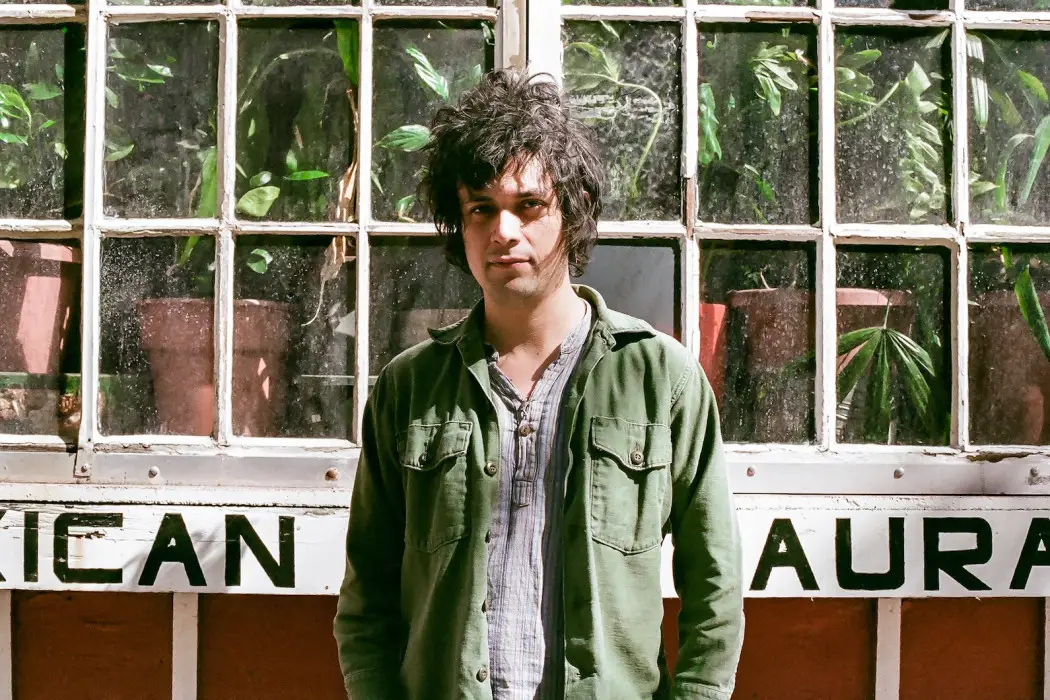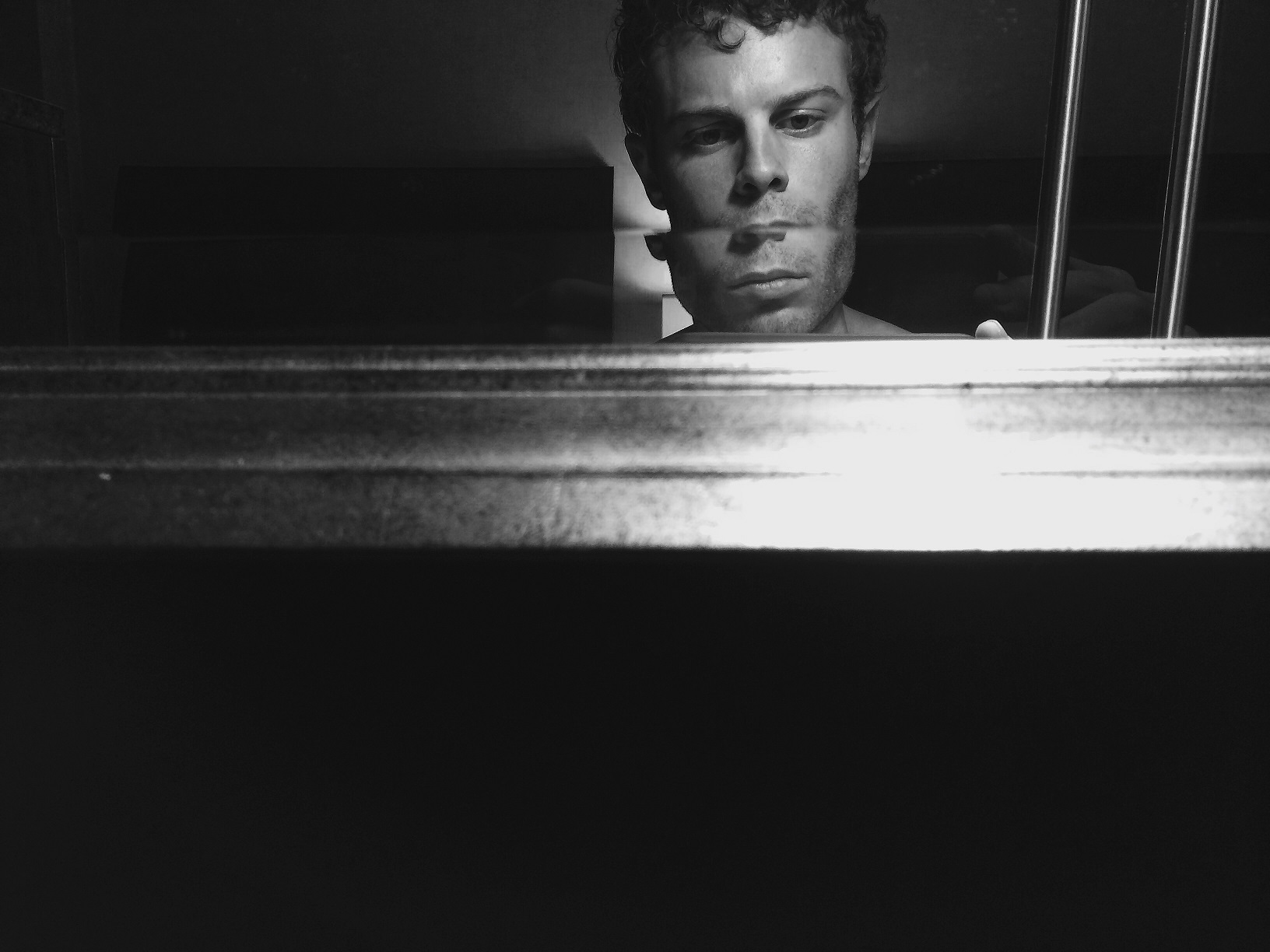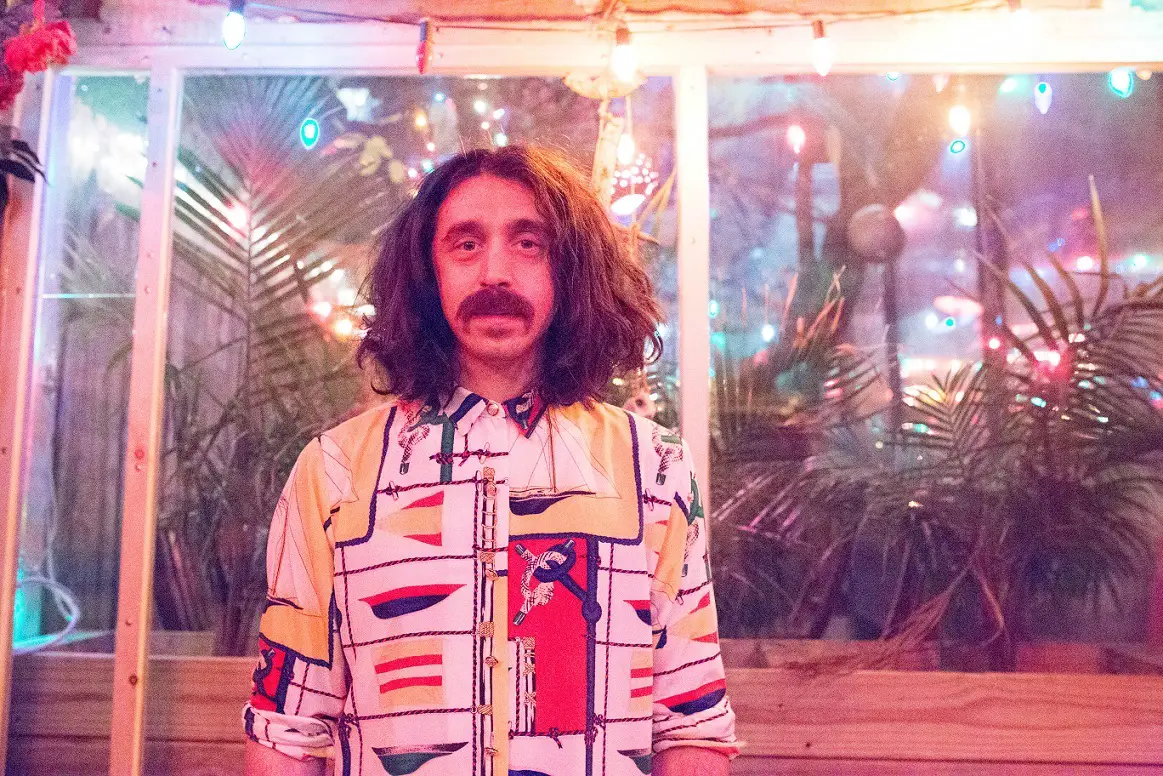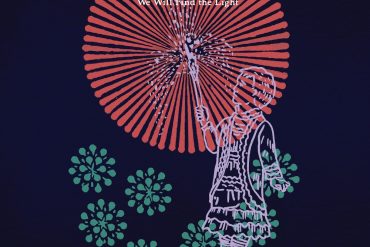Jose Boyer of Las Rosas details the collaborative forces at play in the band’s sophomore release Shadow By Your Side, the true value of art, and what motivates him (spoiler alert: it’s not weed).
— —
In a room full of mirrors, each of the three members of Las Rosas would reflect and exemplify a part of each other that is crucial to the success of the band. The Brooklyn based trio understand each other’s strengths and weaknesses on and off stage. In large part due to the length of time they’ve played music together, but also solely because of an obvious amount of mutual respect and adoration. Their bond is undeniable through the lush, warm tones in their music, but also upon meeting Jose Boyer, front-person and guitarist of Las Rosas, that bond spills over into the amount of credit he attributes to his bandmates, bassist Jose Aybar and drummer Christopher Lauderdale. This is truly a collaborative effort.
Las Rosas’ aura is downright cool. This is a band that takes style and persona seriously. Take their live show for example, expect a performance equipped with glitter, printed pants, satin shirts, and a flare for the refined side of rock and roll. Their music is no different. Las Rosas are edging away from lo-fi and stamping their foot on the centerfold of polished punk rock.

Shadow By Your Side is a testament to the changes Las Rosas have undergone since their debut release, Everyone Gets Exactly What They Want. Boyer discovered the formula to create something purposeful, both in his music and within himself. The proof? In each track of the melodic, groovy sophomore record. Las Rosas formed a fully recognized creative theme under a deadline, which hardly sounds rushed while weaving through punchy basslines, clever lyricism, and jangly guitars.
Atwood Magazine had the opportunity to meet Boyer in Washington Square Park on an absolutely stunning Spring day immediately after he deboarded a plane flying from North Carolina. We found Boyer shielded from the sun, positioned under a tree on a park bench, quietly reading a book. Somehow we forgot to ask which one, but instead, examined people’s perception of art’s worth, his new album, and why it was necessary for him to transition from Austin to Brooklyn.

A CONVERSATION WITH LAS ROSAS
Atwood Magazine: Hey Jose, the last time I saw you was after your Rough Trade show with Dirty Fences. We played Jenga at The Levee.
Jose Boyer: Oh yeah, cool! I remember now. It’s all coming back. (laughs)
I’ve been listening to Shadow By Your Side pretty consistently… It’s fantastic.
Jose: Thank you.
It’s a really massive sophomore release following Everyone Gets Exactly What They Want. How do you feel like the process has changed between that album and this new one?
Jose: I think the process changed a lot. The first record, the one you mentioned, Everyone Gets Exactly What They Want, we wrote those songs all across a large span of time. It was a lot of just getting together to play and seeing what came up. And then, a couple songs I had before I even moved to New York. By the time we had the recording sessions, we had plenty of music to do, we had a really good of what everything was going to sound like. And then once it was done, we just took a lot of time to figure out how we were going to put it out, you know, every aspect of it, and it started to drag a little bit. So, this time we decided to just make an album. We booked studio time before we had any material and we just did it. We did it in two sessions. We didn’t have anything when we booked it and I just had to write on a schedule, which I really liked. It ended up being a little bit less coming out of jams in a rehearsal space and more of just me coming up with, sort of, a full formed idea and then bringing it to them, the other two band members, to polish up, which is kind of their specialty. I can get it to a point where I’m not super happy with it yet, but I know that they’ll push it there.
Totally! The album, to me, has a theme, a very cohesive theme. Sometimes you can listen to an album and tell that some of the songs came from a last record that didn’t make the cut, or something like that, but I can tell with Shadow By Your Side that there’s this cohesive theme. Even the songwriting, it’s not that any of the songs are super similar, but you can get that vibe from the album.
Jose: I think that’s true. I don’t think that any of this stuff was around when the other album was created. There wasn’t any overlap.
You and Christopher have been playing in bands together for awhile.
Jose: Yeah, for a really long time. On and off for like ten years.
Do you feel like that has sort of led to Las Rosas having this really comfortable vibe to it, because you guys have been playing music together for so long that you just get each other?
Jose: Yeah, there’s definitely something in the act of playing where we know what each other might do and we can play around each other. There’s a good dance. It’s where you know what the other person is going to do with what you’re throwing out. There’s that, for sure, and just being friends for so long just makes it really easy and it makes it really hard to imagine doing this same project in any different way.
You lived in Austin before, did either Jose or Christopher live there as well?
Jose: No, Christopher lived in New Orleans right at the same time I moved to Austin, but we met in North Carolina.
That’s interesting! And now you all live here in New York. How do you feel like that changed you as a musician or as a writer, moving from Austin to New York?
Jose: They’re pretty opposite and that was the point. I had been in this band in Austin that was really busy and doing a lot of stuff and when that was over I really got to enjoy that aspect of Austin, at least at the time, it was a very cheap place to live. It was very easy to live there. The attitude of the whole city, and especially the art scene, is really relaxed. Personally, that’s the type of atmosphere that will push me into being a slacker. The moment I realized that I was like, I have to get out of here.
Is the band you’re referring to Harlem?
Jose: Yeah, Harlem.
I was a huge fan, I’m still a huge fan. That one record, Hippies, was really awesome. Did that better prepare you, having a successful run with Harlem, to create Las Rosas or for touring?
Jose: I think it was helpful at the very beginning to be like, “Hey, remember that thing? Here’s this new thing.” And kind of associate the two. Although, that’s less and less now.
They’re very different projects, I think. On this record you opened with “The Ghost.” I’m a little surprised it’s not the closing track! I also feel like “Upstairs Guy” makes so much sense, but “The Ghost” is such a cool song, with such cool breakdowns and jangly guitars, but it’s not that lo-fi sound at all anymore. You can tell that you went into the studio.
Jose: I’ve been wanting to do that for awhile. I’ve been wanting to avoid lo-fi, in a way, unless it was by necessity, which at first it was for us. The first stuff is just me recording and I don’t have much knowledge at all technically about it. That one [“Upstairs Guy”] was hard. I thought maybe it would be the end of the record too. And then it was kind of one of those, “Wait, how about, throw that all out the window and do this.” The track order is always a little contentious. Everyone has their own vision about it in the band and the way we operate is that everyone gets a say, so there was a lot of negotiations.
You write the actual songs, and then Christopher and Jose (Aybar) come in and clean it up?
Jose: Especially nowadays that’s how we’ve been doing it. I find it to be more efficient. If you’re trying to bring in a very loose idea into a rehearsal, everyone’s got a lot of ideas with where it could go and that can be really good, but I find that we don’t have the time for that, the amount of rehearsal that we get to do with being really busy. Also, the amount of time in the rehearsal. You know? You could spend three hours working in one direction and then everyone’s like, “we tried it, we didn’t like it, let’s go back to square one.” By then everyone’s had a 6 pack of beer and then it’s useless.
As a lyricist, I think you’re super clever and witty. “The Ghost” seems pretty vulnerable to me, it sort of seems like you’re singing about someone or something you can’t really pin down. Something that’s out of reach.
Jose: It’s actually two songs in one, which we tend to do a lot. I kind of credit those other guys, I wanted to go back to that a little bit, is that nowadays their role is to really come up with stuff that I couldn’t have really thought about to put in there. They’ll be like, “Wait, how about a guitar solo here. How about change the rhythm.” They do add a lot of stuff to it. They throw in their treatment for the second step. For this one we put those two ideas together into one and they both had a ghost theme. The first one I was really trying to imagine living in a moment of being a little down or low or seasonal, when you kind of realize that it’s kind of a drag, this winter is dragging along, kind of blue. But thinking about that as a roommate that you live with. It lives in your house but it’s not really there and sometimes you want it there and sometimes you want it to get the hell out of there. It’s kind of annoying. It’s like that. Sometimes you’re like, I’m glad I’m down and it’s rainy and I’m into it, but then you want it to go away. I was trying to figure out a way to personify that.
Cool, you did a great job. And then you flow into “Tax Man,” which is a total bop. It’s super groovy and dancey. I was actually listening to that track on the way here. You’re talking about financial stuff in that song, is that a little bit about living in New York and the cost of living?
Jose: That has to do with it, but it’s more about doing art. I wanted a little bit of a dancier song, that was the last one that I wrote for the record. So I had that in mind. When I really sort of listened to the music, usually music comes first for us, it sounded kind of bratty, the chords hitting short and hard, so my initial reaction was to take that idea, the money idea that I had vaguely in my head, and turn it into a kind of complaint. The song sounds like you’re just complaining about being broke but I think it’s much more about this thing that I struggle with. On one side you get really frustrated with how seriously people take art as a culture, you know people get really used to streaming their music for free, and all of that, what people expect to be pay for art or what people expect from it and the access people expect to it. There’s a contrast there. Like if you go to Europe and play venues are sometimes subsidized by the government, or promoters will get money to do cool things, or bands themselves will be funded. I feel like that’s a direct result of, for whatever reason, out there they take it more seriously. If you’re doing something like that it has value, and to access it as a person it’s considered more of like, “Oh, sure we have to support that. We all agree. So, let’s support it.” Within the system but also as individuals. They tend to buy more merchandise, in a way that it’s like “I don’t know if I’m going to love it but I’m going to buy it from you because you’re doing the work.” And here you see a little bit less of that and it’s frustrating. At the same time it feels like such a privileged complaint to have.
Is it though? Are the arts not an important part of society and culture?
Jose: (laughs) I think they are!
Is it a complaint to say that America doesn’t support the arts? Or is it just a fact and kind of a bummer?
Jose: Well, that’s my question. Right? I go back and forth. Sometimes I feel strongly, like exactly what you just said. And sometimes we go on tour and we’re eating fancy dinners, it’s not that we eat fancy dinners but we don’t eat fast food and we like kale salads and all of that, so it feels weird when you’re standing in line at Whole Foods to complain that I don’t get paid enough.
No one in the arts does.
Jose: I go back and forth, there’s something bratty about it.
I totally disagree. I just don’t think there is. Artists don’t get paid in America and they should be.
Jose: Ultimately, I agree with you. I think it comes from personal insecurity that in my head I will go back and forth. It’ll be like first world problems to “Wait a minute, I work way harder at this than I have to show for it sometimes.” So that’s sort of what’s crammed into that short song.
I get it, first world problems, I know, but at the same time they're fucking problems. Every problem is a problem.
Jose: I’m with you (laughs).

I know we touched on this a bit earlier, but you with your songwriting process obviously liked to have that schedule. You like more of a meticulous thing, maybe you’re not walking around typing things in your iPhone notes necessarily, or are you doing that?
Jose: I do a little bit of that, but when it comes down to it, it’s the same kick in the pants that I was looking for getting out of Austin. It’s like, you have a deadline, you booked this studio, it’s motivating. I’ll get home after being out doing random stuff all day and working and then I’ll still have the energy to sit down and make a song because there’s this incentive and pressure.
With Shadow By Your Side since you booked the studio right away, did you basically start working on it as soon as the debut came out?
Jose: It was pretty quick. Jose, he plays bass, but he’s really good at having everything in mind at all times. Like, “Hey, we need more t-shirts for this tour. Hey, we should ask this person about this thing.” He’s always got it. He was really quick on the draw saying we should go to the studio. At first I was like what? But then I was like, okay you’re right, you’re right.
He’s managerial minded.
Jose: A little bit, yeah, he’s great. He’s the only person that I can think of that will smoke a giant bowl of weed and then start checking stuff off of his to-do list. It’s amazing.
Good for him! I quit over the last couple weeks because I’m just not like that. I’d just be like, whatever I had to do I’m not going to do it.
Jose: Yeah, me either. I think that’s the common thing. That’s why I’m kind of same, it’s not regular for me. I have to learn, because if he’s like that, it doesn’t mean I’ll be.
What about Record Store Day today? Are you doing anything for that?
Jose: We do actually have… that’s today right?
Yeah, that’s today!
Jose: We have our single that’s going to be included in the swag bags as a flexi disc for anyone who buys any record store item in a few hundred stores across the country will get the single for free.
With “Christa”?
Jose: With “Tax Man” actually, the second single.
That’s exciting!
Jose: It’s cool, I don’t have one of them myself, I’ll have to get my hands on one to check it out.
Yeah, to have a physical copy of your own work. That’s awesome.
Jose: It’s a little knick-knack promotional item but it’s the best kind. It’s better than a koozie or something.
A lot better. The album, Shadow By Your Side, is coming out May 11 on Greenway Records.
Jose: That’s right.

You guys have been working with Greenway for a bit?
Jose: For a little while. It’s another one of those things. When they got in touch we met Harry from Greenway at one of our shows, actually I think Stuyedeyed played that show, and he came over and said hi and started talking about what he did. He seemed really professional and it was one of those things, just like the recording process, the release process, we wanted to rush it through a little bit. You know, not to rush it through in a reckless way, but as soon as we were in touch with somebody that seemed legit and excited about the project, what’s the point in waiting? Let’s do this. Let’s put it out.
Totally. Greenway is great. They are one of the coolest Brooklyn indie labels.
Jose: They do a really good job. They are always on top of stuff. They get really excited about it.
Do you feel like the record seems rushed to you or are you excited about the final product?
Jose: I’m totally excited about it. I don’t feel like it was a rushed job. In fact, I’m glad that it wasn’t. I’m glad with what I came up with for it. With that, there’s the slight trade off of we’re adding a guitar player to the band for this next tour and I’m coming up with parts for him to play and splitting up guitar duties and as I’m going through the songs with parts for him, I think of parts I wish I had put in the record. It’s a small trade off to have the thing in my hands though. I really didn’t want to drag it along like I did last time. It would’ve been much worse.
On the 11th, your release date, you're doing a show in Montreal, was that where you wanted the release date show to be?
Jose: No, that was just kind of the way it worked out. It’s pretty hard to book a tour specifically around too many dates because you need to have flexibility for the booking agent to be able to find the right city and drive times and everything and the one day we really wanted was at the end, in Brooklyn, we wanted to make sure it was on a weekend. So that’ll be the 22nd, I believe, or the 23rd of June, Saturday. So that is an anchor date that we really wanted to have. He was able to have a lot of wiggle room in the front end of it and Montreal just wound up being on that day.
23rd of June, where? It’s not released yet.
Jose: It’s not announced? I think it was announced yesterday, at Alphaville. I love that place.
Oh, yay, I love that place too! Well, we can have you back here at the end with us in New York. Thank you so much!
Jose: Awesome, thanks!
— —
:: stream/pre-order Shadow By Your Side here ::
— — — —

Connect to Las Rosas on
Facebook, Twitter, Instagram
Discover new music on Atwood Magazine
? © Alexandra Graber








